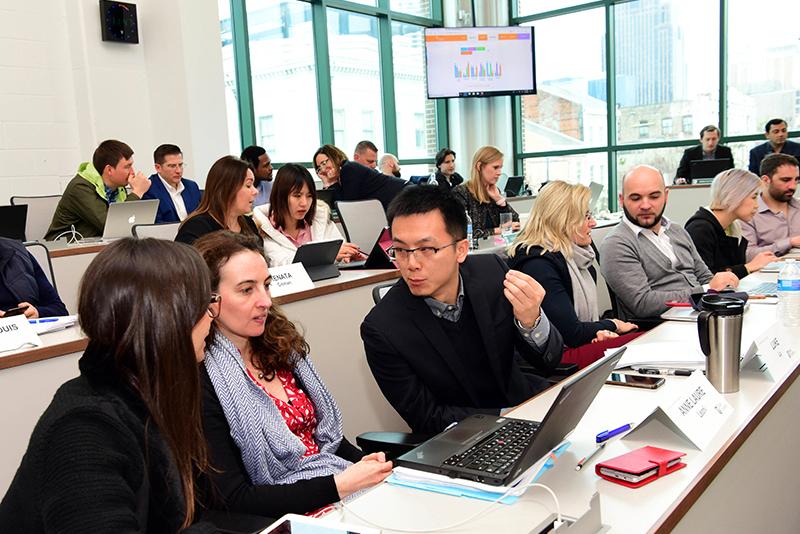The Global Classroom

With Brexit, NAFTA and the U.S.-China trade war dominating news cycles, it’s easy to focus on the differences between nations, but for nearly 100 international executive MBA students who took part in an A. B. Freeman School of Business seminar last week, the biggest takeaway was their similarities.
“Whatever topic we discussed in class, there were far more commonalities in our career experiences and the type of issues we face,” said Claude Davis, a principal scientist and brand ambassador with Zatarain’s. “Whether it was a generational issue with employees or performance management systems in the workplace, there were more common experiences than there were differences.”
The International Intensive Week Seminar is an annual event that brings students in the Freeman School’s New Orleans and Houston executive MBA programs together with executive students from partner institutions around the world.
This year’s program, which took place Jan. 18-24 at the Freeman School’s new downtown facility, the Stewart Center CBD, drew students from China, Colombia, France and Lithuania, who shared a classroom with their American peers and worked on projects together as part of multinational teams.
“It's one thing to talk to people about managing different cultures in an organization, but it’s very different when they actually experience it firsthand in a cross-cultural team during international week,” said Alex Sleptsov, assistant dean for executive education at the Freeman School. “Pedagogically, I think it’s an important exercise, and very few other schools actually do something like this.”
In addition to completing two courses, International Leadership & Ethics and Managing People Internationally, the students ate together, socialized together and even watched the Saints play the Rams in the NFC Championship Game together. That combination of formal and informal interactions went a long way toward breaking down cultural barriers and fostering conversation.
“There was a lot of dialogue about the differences and similarities between our countries, and in a very open and frank way that I think would have been very difficult if we were meeting in a business environment,” said Judith McGuire, an executive with Discover Financial Services in Houston. “I think that really safe, open sharing of perceptions and misconceptions was extremely valuable.”
“It was really good to get everyone in a room and break down those misconceptions that you often have about people from other countries,” said Tari Ricks, a clinical program manager with Humana. “At the end of the day, it’s not about where you come from. It’s about what you do.”
“There are differences, but in the end — when it comes to real issues concerning management — it’s not different at all,” added Charles-Louis Melchior, a French EMBA student who works as a senior business development manager with Storengy in Berlin. “We may have different tools or approaches to tackle the issues, but the issues are the same. That’s why it’s very interesting to learn from others and learn their specific approaches.”
If there was an overriding theme for the week, Sleptsov says, it was that business is business the world over.
“Of course we want to teach our students how to manage cross-cultural differences, but let’s not over emphasize those differences,” Sleptsov said. “The different business frameworks we teach the students work in different countries precisely because a lot of things are similar, even though on surface they may not appear to be.”
Interested in advancing your education and/or career? Learn more about Freeman’s MBA programs. Find the right program for you.
Other Related Articles
- Futurist series highlights consumerization of health care
- Executive MBAs team up with peers from around the world for International Week
- Freeman partners with Leland to provide personalized coaching for Executive MBAs
- Alum brings rugby mindset to new consulting program
- ENFRA partners with Stewart Center to launch executive leadership program
- Freeman Futurist Series looks at AI, Robotics and Quantum
- Restaurateur gives lessons in history and hospitality
- EMBA Marine rises through the ranks
